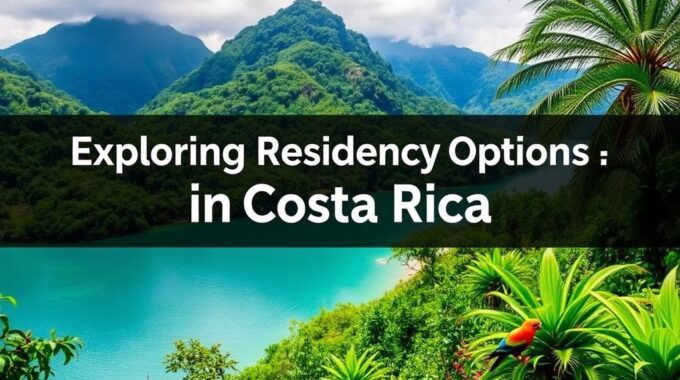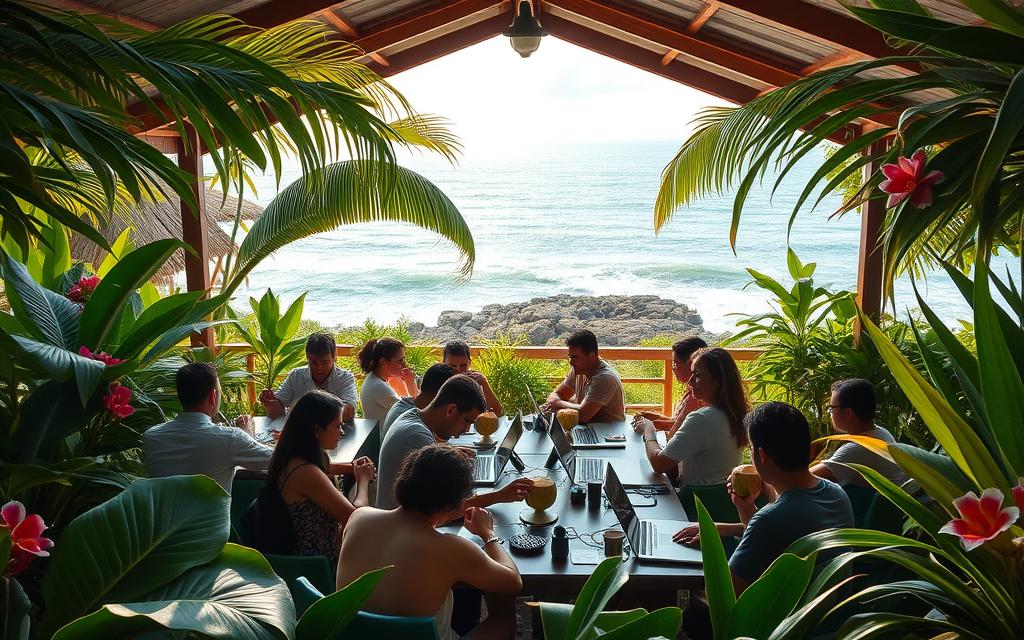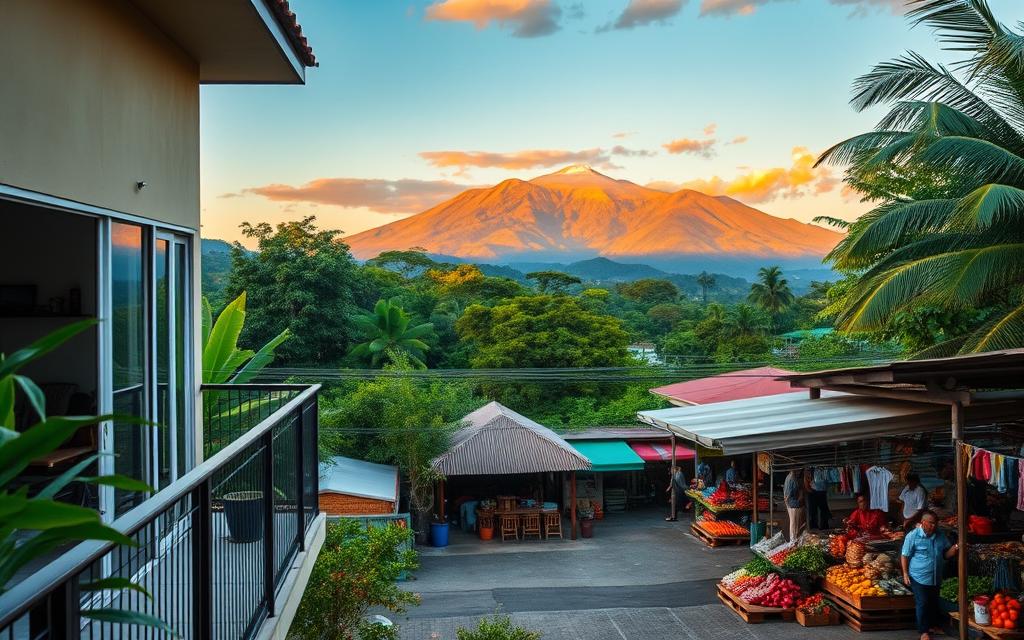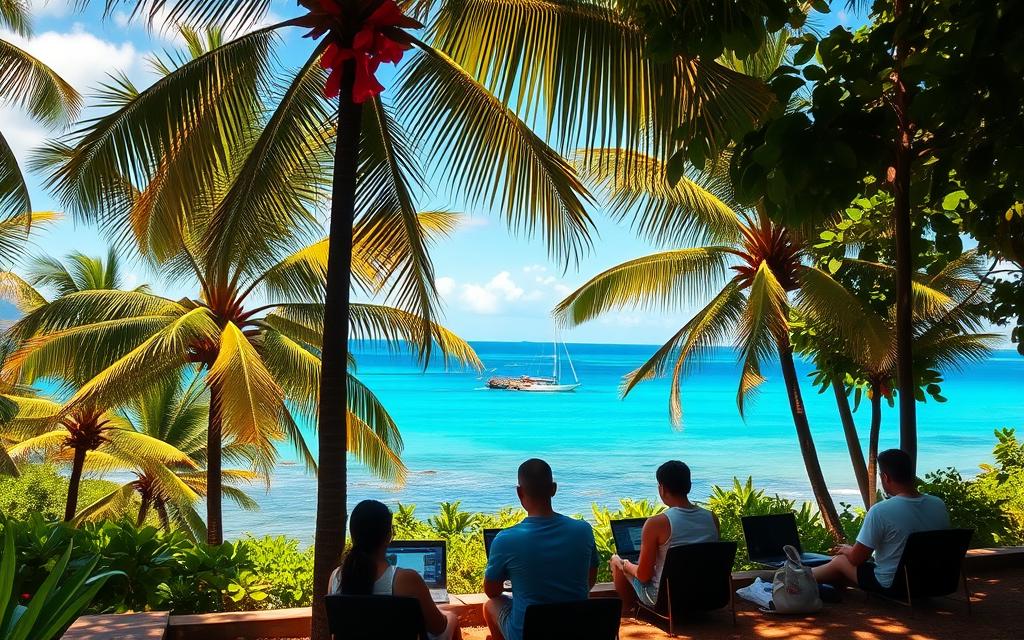Discover equity lending opportunities in Costa Rica real estate through GAP Investments. Private loans from $50,000 to $3,000,000 with interest rates from 12%.

How to live in Costa Rica as a digital nomad: residency guide
Costa Rica has emerged as a top destination for digital nomads, offering a unique blend of natural beauty and modern amenities. With its expanding infrastructure to support remote work, the country has become an attractive location for those seeking a relaxed lifestyle.
The recently introduced digital nomad visa program provides benefits like tax exemptions, making it easier for remote workers to stay in the country long-term. Costa Rica Immigration Experts (CRIE) has helped many clients achieve their dream of living in Costa Rica, with over 20 years of experience and thousands of successful residencies.
This comprehensive guide will explore the essentials of living in Costa Rica as a digital nomad, from visa requirements to the best locations for remote work, and provide practical information on cost of living, internet connectivity, and accommodation options.
The Rise of Digital Nomadism in Costa Rica
The concept of digital nomadism has seen a significant surge in Costa Rica over the past decade. Costa Rica is known for its “Pura Vida” lifestyle, which has attracted a growing number of digital nomads.
Costa Rica has experienced a transformation from a tourist destination to a hub for remote workers seeking long-term stays. Several factors have contributed to this trend:
- The COVID-19 pandemic accelerated the shift to remote work, with professionals seeking destinations offering natural beauty and quality of life.
- The Costa Rican government has implemented policies and infrastructure improvements to attract digital nomads.
- The introduction of the Digital Nomad Visa in 2021 formalized Costa Rica’s commitment to welcoming remote workers.
As a result, Costa Rica has become a premier destination for digital nomads, offering a unique combination of natural wonders, stable political climate, and growing ecosystem of coworking spaces.
Why Costa Rica is Perfect for Digital Nomads
With its lush rainforests, pristine beaches, and vibrant culture, Costa Rica is an ideal destination for digital nomads seeking a balanced lifestyle. The country’s unique blend of natural beauty and modern amenities provides an inspiring backdrop for remote work and weekend adventures.
Natural Beauty and “Pura Vida” Lifestyle
Costa Rica’s breathtaking landscapes, from beaches to rainforests, embody the “Pura Vida” philosophy, which emphasizes simplicity and enjoying life’s small pleasures. This lifestyle creates an environment where digital nomads can escape the stress of urban living and focus on their work-life balance.
Proximity to North America
Costa Rica’s proximity to North America makes it convenient for digital nomads to maintain regular communication with US-based teams. Being in the Central Time Zone allows for overlap with North American business hours, facilitating seamless collaboration and business operations.
Stable Political Climate
Costa Rica’s stable democracy, established since 1949, provides security and peace of mind for digital nomads. The country’s commitment to sustainability and environmental conservation also resonates with those who prioritize eco-friendly living and responsible tourism.
Understanding the Costa Rica Digital Nomad Visa
With the introduction of the Digital Nomad Visa, Costa Rica is now a more accessible destination for remote workers. This visa is designed to attract international talent, offering a streamlined process for digital nomads to live and work in the country.
Eligibility Requirements
To be eligible, applicants must demonstrate a stable monthly income of at least $3,000 for individuals or $4,000 for families, obtained from sources outside of Costa Rica. They must also provide proof of health insurance with minimum coverage of $50,000 for medical expenses.
Application Process
The application process involves submitting documentation through the official digital platform, paying application fees, and potentially attending an appointment at a Costa Rican consulate. The required documents include proof of income, health insurance, and a clean criminal record.
Benefits and Tax Exemptions
Key benefits of the Digital Nomad Visa include exemption from income tax on earnings from foreign sources, import tax exemptions for essential work equipment, and the ability to open a local bank account. These benefits make Costa Rica an attractive destination for digital nomads.
Alternative Visa Options for Long-Term Stays
Beyond the digital nomad visa, Costa Rica offers additional residency options for long-term stays, catering to diverse needs and preferences.
Rentista Visa
The Rentista visa is designed for individuals who can demonstrate a stable, unearned income of at least $2,500 per month for two years, typically through a bank deposit of $60,000 that generates monthly interest. This visa is particularly suitable for self-employed professionals, investors, or those with substantial savings who don’t qualify for the digital nomad visa’s income requirements.
Pensionado Visa
The Pensionado Visa caters to retirees with a lifetime pension of at least $1,000 per month, making it an option for older digital nomads or those who have early retirement income. Both the Rentista and Pensionado visas offer pathways to permanent residency after three years, providing long-term security for those who fall in love with Costa Rica.
For digital nomads planning extended stays beyond the digital nomad visa’s duration, Costa Rica offers alternative residency options that can provide more permanent solutions. Both visa types initially grant temporary residency for 2-3 years but offer pathways to permanent residency and eventually citizenship.
Top Destinations for Digital Nomads in Costa Rica

With its unique blend of natural beauty and modern amenities, Costa Rica is a top choice for remote workers. The country offers a variety of destinations that cater to different lifestyles and preferences, making it an ideal location for digital nomads.
Santa Teresa: Surfers’ Paradise
Santa Teresa combines stunning beaches, lush jungles, and a thriving digital nomad community with coworking spaces and world-class surfing. It has evolved into a hotspot for remote workers seeking adventure and productivity.
Tamarindo: Young Expat Hub
Tamarindo attracts a younger crowd with its vibrant nightlife, established expat community, and excellent amenities, making it ideal for young digital nomads. For more information on living in Costa Rica, visit CRIE’s guide.
San José: Urban Convenience
San José, the capital city, provides urban conveniences with numerous coworking spaces, cultural attractions, and reliable internet infrastructure, appealing to digital nomads who prefer city living.
Puerto Viejo: Caribbean Charm
Puerto Viejo offers a unique cultural experience with Afro-Caribbean influences, reggae vibes, and stunning black sand beaches, attracting digital nomads seeking a laid-back Caribbean lifestyle.
Cost of Living for Digital Nomads

Living in Costa Rica as a digital nomad can be surprisingly affordable, with a range of options for accommodation, food, and transportation. The country’s cost of living is a significant factor for digital nomads considering this tropical paradise as their next destination.
Housing Expenses
Housing costs in Costa Rica vary significantly depending on the location. Monthly rentals can range from $500-$700 in less touristy areas to $1,000-$2,000 in popular digital nomad destinations like Santa Teresa and Tamarindo. For instance, a furnished apartment in San Jose might cost around $1,200 per month, while accommodations outside city centers could be found for $600.
- Long-term rentals offer better value than short-term stays, with discounts available for 3+ month commitments.
- Prices can be higher during peak season, but significant savings can be found during the green (rainy) season from May to November.
Food and Dining Costs
Food expenses can be managed efficiently by shopping at local farmers’ markets (ferias) where fresh produce costs a fraction of supermarket prices. Eating at local sodas (small restaurants) offers authentic meals for $5-7. On average, a couple might spend around $375 per month on food.
- Local cuisine is not only delicious but also affordable, allowing digital nomads to enjoy the local culture without breaking the bank.
- Cooking at home using locally sourced ingredients can significantly reduce monthly expenses.
Transportation and Utilities
Transportation costs depend on lifestyle choices. Public buses are extremely affordable, often costing $1-5 for intercity travel. Car rentals average $400-600 monthly and provide greater flexibility for exploring remote areas. Utilities, including electricity, water, and internet, typically range from $100 to $ 200 monthly.
- Electricity costs can be higher in hotter coastal areas where air conditioning is necessary.
- Public transportation is a convenient and affordable option for digital nomads who prefer not to rent a car.
For digital nomads, Costa Rica offers a compelling mix of affordability and quality of life. Monthly expenses for a couple might average around $1,285, including rent, utilities, transportation, food, healthcare, and extras. By making informed choices about housing, food, and transportation, digital nomads can enjoy a comfortable lifestyle in this beautiful country.
Finding Accommodation in Costa Rica
From beachside apartments to urban condos, Costa Rica offers a diverse range of accommodations for digital nomads. Housing options abound, ranging from short-term rentals to long-term stays.
Short-Term Rental Options
For digital nomads, short-term accommodation options include hotels, hostels, Airbnb rentals, and coliving spaces. Prices vary significantly by location and season, with platforms like Airbnb and VRBO offering flexibility for stays of 1-3 months. Negotiating directly with hosts can secure discounts of 30-50% off listed prices.
Long-Term Housing Solutions
Long-term housing solutions (3+ months) are best found through local Facebook groups, expat forums, and on-the-ground networking. Digital nomads should prioritize reliable internet connectivity, proximity to coworking spaces, access to amenities, and safety considerations when evaluating potential accommodations in Costa Rica.
Internet Connectivity and Working Remotely

With its growing expat community, Costa Rica has made significant strides in improving its internet infrastructure for remote workers. The country’s diverse regions offer varying levels of internet connectivity, a key consideration for digital nomads.
Internet Providers and Speeds
Costa Rica’s main internet service providers include Kolbi, Liberty, and Tigo, offering various packages and speeds. Urban areas and popular digital nomad destinations have fiber optic connections with download speeds of 50-100 Mbps.
Mobile Data Options
Mobile data provides a reliable backup option for remote workers, with carriers offering affordable prepaid plans and 4G coverage available throughout most populated areas and tourist destinations.
Digital nomads often employ a dual-connectivity strategy, maintaining both home internet and mobile data plans to ensure uninterrupted work capability. Coworking spaces throughout Costa Rica also offer reliable internet connections with dedicated business-grade service and backup systems.
Coworking Spaces Across Costa Rica

As a hub for remote workers, Costa Rica offers a diverse range of coworking spaces that blend productivity with the “Pura Vida” lifestyle. Costa Rica’s coworking ecosystem has expanded rapidly to meet the needs of digital nomads.
Popular Coworking Locations
Costa Rica is home to 18 coworking spots, with 11 under the Selina brand. San José offers the highest concentration of professional coworking spaces, including modern facilities with meeting rooms and event spaces. Coastal destinations like Tamarindo and Samara Beach feature more laid-back coworking environments with ocean views and lifestyle amenities.
Pricing and Amenities
Pricing structures vary based on location and amenities, with hourly passes ($3-8), day passes ($10-20), weekly options ($50-100), and monthly memberships ($100-300). Popular coworking spaces include Selina CoWork San José ($12/day or $170/month), Gracias Coffee & Cowork ($10/day or $100/month), and Puerto & Co. Coworking Space & Vegan Café ($15/day, $150/month).
Coworking spaces in Costa Rica serve not only as workplaces but also as community hubs for digital nomads, hosting workshops, language exchanges, and social events.
Transportation Options for Digital Nomads
For digital nomads in Costa Rica, navigating transportation options is crucial for maintaining productivity and exploring the country. The transportation landscape offers a range of choices to suit different needs and preferences.
Public Transportation System
Costa Rica’s public transportation system is centered on an extensive bus network, which connects most towns and cities. Fares are highly affordable, typically ranging from $2-10 for intercity travel. However, public buses often follow indirect routes and have infrequent schedules in rural areas, making them less practical for digital nomads who require flexible work schedules.
Rental Cars and Ridesharing Services
Rental cars provide maximum flexibility for exploring Costa Rica’s diverse regions, although they come with significant costs ($400-800 monthly) and navigational challenges on sometimes poorly maintained roads. Ridesharing services like Uber operate primarily in the Greater Metropolitan Area around San José. Many digital nomads opt for a hybrid approach, using public transit for longer journeys and renting motorbikes or bicycles for local transportation in beach towns and smaller communities. For more insights on living in Costa Rica, check out CRIE’s expat guide.
Banking and Financial Considerations
Managing finances is crucial for digital nomads living in Costa Rica. As they navigate their new environment, understanding the local banking system and financial options becomes essential for a seamless experience.
Opening a Bank Account in Costa Rica
Opening a local bank account in Costa Rica typically requires residency status, which can be challenging for digital nomads on tourist visas. However, the digital nomad visa program facilitates banking access for qualified applicants. Major banks like Banco Nacional, BAC Credomatic, and Scotiabank offer services in English.
Managing International Finances
Digital nomads often rely on international banking solutions like Wise, Revolut, or N26 for day-to-day transactions, benefiting from competitive exchange rates and reduced fees. ATM withdrawals are also common, though they come with daily limits and fees. Tax considerations are crucial, as the Costa Rica digital nomad visa exempts holders from local income tax on foreign earnings.
Healthcare and Insurance Requirements
As a digital nomad considering Costa Rica as your next destination, understanding the healthcare and insurance requirements is crucial. Costa Rica’s healthcare system is highly regarded, with both public and private options available.
Public vs. Private Healthcare Options
Costa Rica’s healthcare system includes the public Caja Costarricense de Seguro Social (CCSS), which provides universal coverage, and a network of private hospitals offering high-quality care. The public system is comprehensive but may involve waiting periods for non-emergency care, making private healthcare a practical choice for short-term residents.
Meeting Visa Insurance Requirements
To obtain the digital nomad visa, applicants must secure private health insurance with a minimum coverage of $50,000 for medical expenses throughout their stay. Policies are available from both international providers and local Costa Rican insurers, with costs ranging from $60 to $250 a month, depending on the coverage.
Building a Community: Networking for Digital Nomads
As a digital nomad in Costa Rica, you’re part of a growing community that values connection, collaboration, and cultural immersion. The country’s unique environment fosters a vibrant community of like-minded individuals who come together through various events and initiatives.
Digital Nomad Events and Meetups
Costa Rica hosts numerous events and meetups tailored to digital nomads, providing ample opportunities to network and build relationships. Popular destinations like San José, Tamarindo, and Santa Teresa are hubs for these activities.
- Regular meetups and skill-sharing workshops are common in major towns.
- Coworking spaces often host professional development workshops and social gatherings.
- International communities like Nomad List and InterNations organize events that bring together short-term and long-term digital nomads.
Online Communities and Resources
Online platforms play a crucial role in connecting digital nomads in Costa Rica. Facebook groups such as “Digital Nomads Costa Rica” and “Expats in Costa Rica” are valuable resources for finding accommodation, sharing local insights, and connecting with fellow remote workers.
- Location-specific communities offer targeted support and information.
- Building relationships with local Costa Ricans (Ticos) enhances the digital nomad experience through language exchanges and community initiatives.
How to Live in Costa Rica as a Digital Nomad: Practical Tips
As a digital nomad in Costa Rica, you’ll need to adapt to the local environment and lifestyle. The country’s unique climate and cultural nuances can impact your daily life and work.
Adapting to Seasonal Changes
Costa Rica has two distinct seasons: the dry season (December to April) and the green or rainy season (May to November). During the rainy season, be prepared for afternoon downpours that can affect internet connectivity and transportation. However, this period also brings lower accommodation costs and fewer tourists.
Safety Considerations and Best Practices
To ensure a safe experience, take standard precautions such as avoiding displaying valuable electronics in public and using official taxis or rideshare services at night. Researching neighborhood safety before booking accommodation is also crucial. By being aware of your surroundings and taking necessary precautions, you can have a secure and enjoyable experience living in Costa Rica as a digital nomad.
Weekend Adventures and Work-Life Balance
The laid-back ‘Pura Vida’ lifestyle in Costa Rica makes it an ideal destination for digital nomads to find their work-life balance. With its diverse landscapes and ecosystems, Costa Rica offers a unique blend of work and adventure opportunities.
National Parks and Natural Attractions
Costa Rica’s compact size makes weekend adventures highly accessible. The country’s 30 national parks protect diverse ecosystems, offering digital nomads endless opportunities for hiking, wildlife watching, and nature photography. Popular destinations include Manuel Antonio National Park, Arenal Volcano, Monteverde, and Tortuguero.
Beach Activities and Surfing Spots
The Pacific coast provides world-class surfing opportunities for all skill levels. Tamarindo, Jacó, and Dominical offer consistent waves and surf schools, making them ideal spots for digital nomads to enjoy beach activities and improve their surfing skills.
Professional Assistance with Costa Rica Immigration Experts

Navigating the complexities of Costa Rica’s immigration process can be challenging, but CRIE is here to help. With over 20 years of experience and thousands of successful residencies, CRIE has established itself as one of the oldest and most trusted immigration firms in the country.
Services Offered by CRIE
CRIE offers comprehensive assistance with all aspects of the residency process, including digital nomad visa applications, document preparation, and representation before immigration authorities. Their services include:
- Personalized consultations to assess individual situations
- Document authentication and translation
- Application filing and follow-up
- Ongoing support throughout the residency process
Consultation and Contact Information
Digital nomads can schedule a personalized consultation via WhatsApp (+506-8373-2085 or +506-8706-3888), phone (USA: +1-305-906-6784, Canada: +1-416-900-5773), or email (info@crie.cr) to discuss their specific situation and receive tailored guidance.
Conclusion
With its “pura vida” lifestyle, Costa Rica has emerged as a top destination for digital nomads worldwide. Living as a digital nomad in Costa Rica offers a unique blend of natural beauty, modern amenities, and a supportive community. The digital nomad visa simplifies the legal process for extended stays. While challenges exist, the benefits far outweigh the drawbacks. Costa Rica offers digital nomads a welcoming community and the perfect balance of productivity and paradise.


